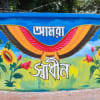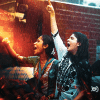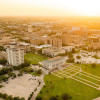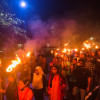Post quota movement campus: What do the students expect from their university campus?

A few days into the quota reform movement, a video surfaced on social media which acted as a reality check for me and the violence that was yet to begin. A female protester from Sir Salimullah Medical College (SSMC) was seen getting assaulted by some senior male students of their own institution on July 16. Just when I thought assaulting female students peacefully protesting might be off limits, at least in a reputed medical college like SSMC, I was proven wrong.
It also made me wonder, after the dust settles, how will these students feel safe on campus upon their return? To understand the hesitations about returning to campus under the current circumstances, we must perceive the factors behind such fears.
"The hall allotments are controlled entirely by different factions of the politically active groups," said Nowrin*, a student of Sir Salimullah Medical College. "The hall proctor is only present by name whereas the entire process is controlled by politically active lobbyists. Usually, rooms allotted for 3-4 people are taken up by 1-2 politically powerful students whereas non-political students have to get stuffed into over-crowded rooms. Therefore, most students are somewhat forced to get enlisted in the politically active groups just to manage seats in the halls and avoid discrimination. They're forced to take part in political activities and any refusal is dealt with threats regarding hall allotments since they're controlled by political leaders."
"During the quota movement, the politically active leaders stopped the general students from participating in peaceful movements from the very beginning. Since the male students were actively intimidated into not participating in the movement, female students initiated the peaceful protests," continued Nowrin.
She adds, "When the politically active leaders met the peaceful protests with violence, the male students also joined and the entire student body united. After that, waves of attacks were made on the students and they were forced to evacuate the halls. There were even threats of sexual harassment and so, a lot of the female students didn't return to the halls out of fear. They had to hide in their relatives' or friends' houses and following the curfew the next day, they couldn't return to their hometowns until a week later. Following the eviction, screenshots of the group-chats of politically active groups were leaked, which revealed their plans of taking actions against the protesters once the campus re-opens. Social media posts, containing fabricated claims of some protesting students being involved with banned political groups, also started circulating."

Most students with hall allotments are scared of severe repercussions from politically active groups once they return to the halls, as told by Rafayet*, a student of Shahjalal University of Science and Technology (SUST), "The students have this fear that after the movement, the ones participating in the protests will be targeted by these politically active groups. Some passive threats made by them as well as past experiences support this fear. There were also instances of these politically active individuals attacking the protesters. This, along with questionable arrests made by the authority, adds to this fear."
Although general residents of the halls of Dhaka University made the hall authorities ban student politics from the dormitories, there's sustaining fear of what the repercussions might be once student politics creep their way in once again.
"Some of us, who've always been aware of the injustices inflicted by these politically active groups, knew an attack might be eminent. But we didn't expect it to be this brutal," said Ishat*, a student of Dhaka University.
"If these groups somehow made their way back into the campus, it'll be very traumatising for the common students, especially for the dorm students who've witnessed what these groups are capable of firsthand, for years now. After the attacks, even the students who weren't aware of the violent nature of these political groups are conscious now," she added.
But even after the recent violent spree on university campuses all over the country, students still want to go back to their campuses and get back to classes. However, they don't want to return under the previous circumstances, but under a new campus run by and for the general students.
"Firstly, to ensure their safe return to the campus, the illegal arrests by the law enforcement authorities must be stopped and the students' complete safety must be guaranteed," said Imran Hassan Shuvo, a student of Jahangirnagar University (JU).
He furthers said, "In JU, law enforcement agencies, politically active groups, and armed thugs have attacked the students. The campus needs to be made safe from them. A proper environment must be ensured for students to reside in the dormitories. Only when the security of the general students can be ensured, the students will be able to return without fear."
Ishat also adds, "We've worked really hard to ban student politics from our dorms. As we've got signed documents from our provosts banning student politics, we would like to keep it that way. Considering the havoc that was caused by these politically active groups, it would be better if we could abolish student politics altogether. Rather, we need to have non-political student forums in every institution that would help us, the students, connect with the administration."
In regards to the matter, Nowrin adds, "After the recent violence on general students by the politically active students, we've conducted batch-wise surveys on whether they want student politics or not and up until now, more than 95 percent of students are against student politics on campus."
"The general students have presented a 6-point demand, which includes– banning student politics on campus, rusticating those involved in the attacks on the protesters, banning any sort of politics or lobbying regarding hall allotments, evicting all non-student hall residents immediately, formal apology from our principal and a guarantee of taking no academic measures or threats against the protesters. Only then will the general students return to the campus again," Nowrin said.
"As a student, I would like to see the dorms free from any political influence," said Rafayet. "The hall allotments should be as per merit. I would also like to see our teachers held accountable and performing their duties fairly and ensuring the students' safety. All of us want politics banned from the campus at this point."
Although it started as a quota reform movement, due to the unimaginable violence inflicted upon the students and citizens over time, the movement has changed its direction. For university students, it's not just about quota reform anymore. It's a struggle and an opportunity for them to renovate their university, reform student political conditions on campus, and for the general students to take control over what's rightfully theirs.
*Names have been changed upon request.

 For all latest news, follow The Daily Star's Google News channel.
For all latest news, follow The Daily Star's Google News channel. 








Comments